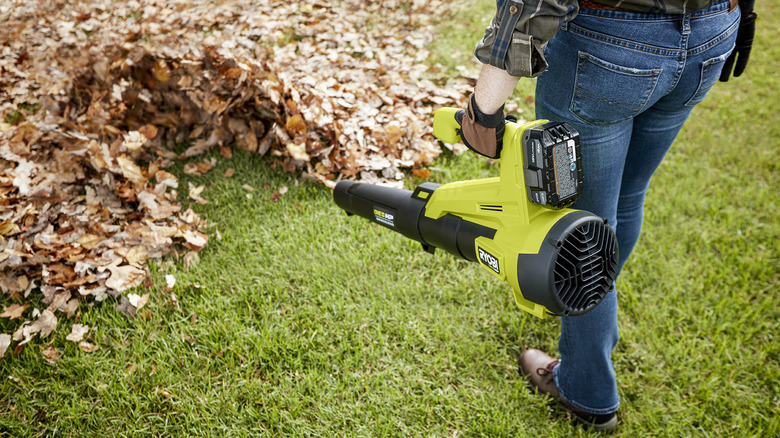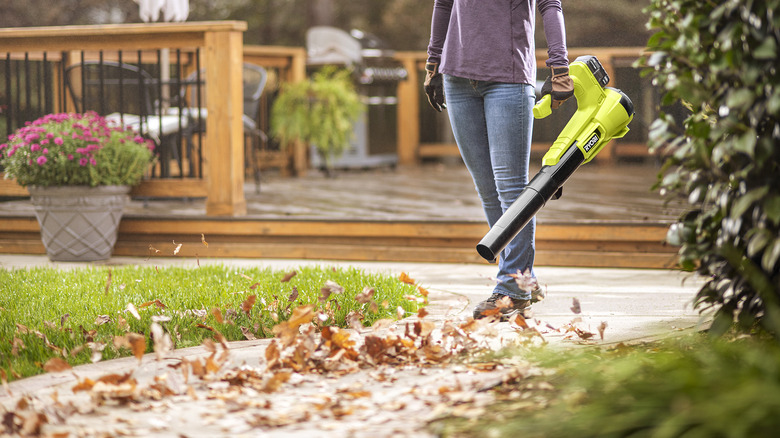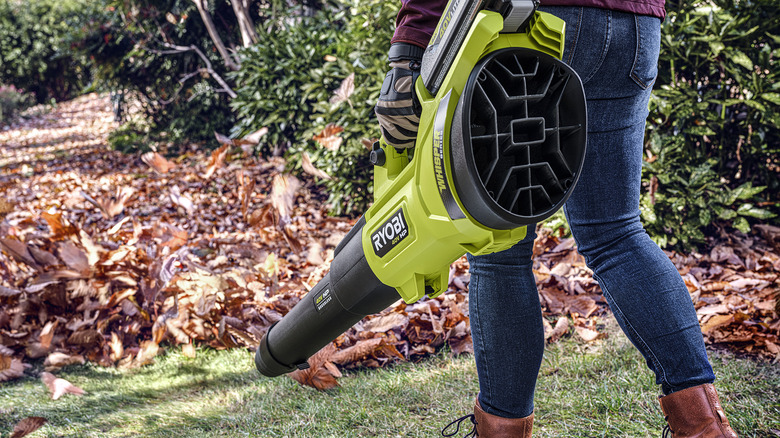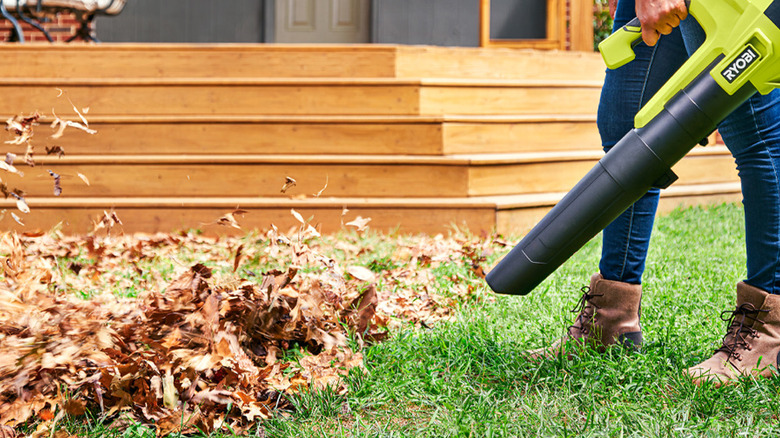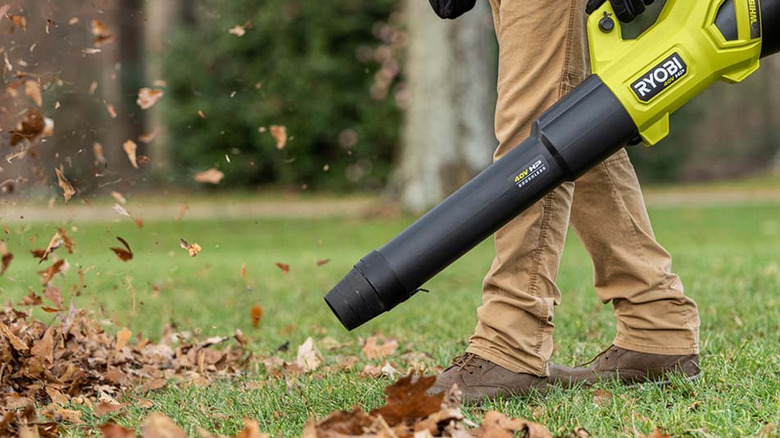Ryobi 18V Vs 40V Blower: Which Is Best For Your Yard?
Ryobi is a popular and affordable brand exclusive to Home Depot, so chances are high that you have seen its tools if you shop there. A big benefit is that people who invest in the Ryobi brand can use the same battery and chargers with all of their tools if they are part of the same line, which is broken up into two battery groups: 18V ONE+ and 40V. While the 40V tools don't carry the ONE+ name, the 40V batteries work with all the tools in the 40V line if they fit.
If you're looking to clean up your yard with a blower or other Ryobi lawn tools, you might have your eye on a 40V option. The 40V tools are bigger and tend to be stronger, but they come with some tradeoffs. The biggest is the price, as the 40V typically costs more, but it could be worth it if you have a big yard. You might assume 40V tools are better, and that's largely true, but it comes down to a variety of factors.
What are the 18V Ryobi blowers?
There are several blowers to pick from in the 18V One+ Ryobi line. If you've already invested in Ryobi 18V tools, you can save cash and pick up the blower without a battery. If that's not the case, there are plenty of kits to pick up that come bundled with the blower, charger, and battery. The blowers vary greatly by their cubic feet per minute (CFM) rating, and typically, the higher the CFM, the more powerful and expensive the blower gets.
For 18V blowers, we see a low point of 200 CFM and a high point of 510 CFM. There are many rungs on the ladder getting up to that point, with 220, 250, 280, 325, 350, and 450 rounding out the lineup. The high CFM blowers can take on bigger tasks like larger yards, wet leaves, lawn debris, etc. Even the lower CFM blowers can work in those scenarios, but they will take longer than the high-powered options.
All these blowers take Ryobi's 18V battery, but you'll get longer runtime from the tools if you opt for a battery with more amp-hours (Ah). For example, the 325 CFM blower has up to 15 minutes of runtime with a 4 Ah battery included with the kit, but if you grab a bigger 6 Ah battery, you can get a little more runtime out of it.
What are the 40V Ryobi blowers?
Moving up to the 40V Ryobi blowers, we see the CFM take a big leap. That's to be expected since these are more powerful and expensive blowers. While the 18V blowers cap out at 510, the 40V blower goes up to 730 CFM with stops at 300, 450, 525, 550, 600, and 650 along the way. Like the 18V blowers, you can omit the battery and charger purchase to save some cash if you're already invested in the 40V line of Ryobi tools.
Where the 18V blowers are lighter and easier for the average person to use, the 40V blowers can get quite large. For example, the 730 CFM blower has a backpack option powered by two 40V batteries. You can still stick with a handheld blower if you don't need the power the high-end backpack option provides. With this tier, you're starting to look at these blowers as gas replacements, and that's not going to be something everybody needs for their yard.
Are Ryobi 40V tools better for your yard?
Bigger yards typically benefit from the more powerful tools with the bigger batteries. For example, the Ryobi 40V chainsaw with a strong motor is better for trimming larger branches than a smaller 18V chainsaw. Both would work, but if you want to maximize efficiency, getting the more powerful option makes more sense. The same thing applies to blowers, so you'll need to decide whether the extra power is worth the extra cost.
Some owners note that the 40V blower is great for blowing heavy leaves and that the 18V option might not be the best — something Ryobi agrees with. The smaller blower is perfectly fine for blowing around debris and is great for smaller yards that aren't a complete mess. If you have a lot of real estate to deal with, you'll benefit from the bigger 40V option. Big piles of heavy and wet leaves will be tough for an 18V blower, while a 40V blower can make quick work of it. You can even use the heftier 40V blowers to dry off your car quickly after washing it.
Ultimately, it comes down to lawn size, so if you can benefit from the extra strength the 40V options provide, then you should go for it. Just keep in mind that it comes at an increased price, and the 40V batteries won't have as much versatility as your 18V options. Many more Ryobi tools, like drills, saws, and trimmers, use the 18V One+ batteries than the 40V batteries.
What Ryobi blower is best for you?
The 40V blowers are stronger than the 18V options; for example, the 40V 550 CFM blower excels at blowing away damp and dry leaves. It's also a favorite among buyers with a 4.6 out of 5 rating on Home Depot's website based on more than 4,300 reviews.
However, not everyone will benefit from the higher power of the 40V blowers. Picking up a smaller 18V 250 CFM blower means you can clean up your sidewalk and driveway. One Home Depot reviewer notes that this blower does that job well, but it's not strong enough to blow away mulch, which is a good thing. In this situation, a weaker blower is better as you only want to blow away leaves from your garden area, not the mulch.
A bigger blower is generally better for taking on big jobs like clearing your entire yard of debris. The 40V 730 CFM blower is comparable to a 27cc gas blower, so it packs quite a punch at 190 MPH — and Pro Tool Reviews gave it a glowing 9.6 out of 10 score. However, the cost is $329 for the kit, whereas the 18V 250 CFM blower is only around $120 but only delivers 90 MPH, so there is a tradeoff. The reality is that while the 40V blowers are stronger and typically better, you likely won't reap all the benefits if you have a smaller yard.
